Inside the Dodgers' collapse: Why baseball's winningest team isn't in the World Series
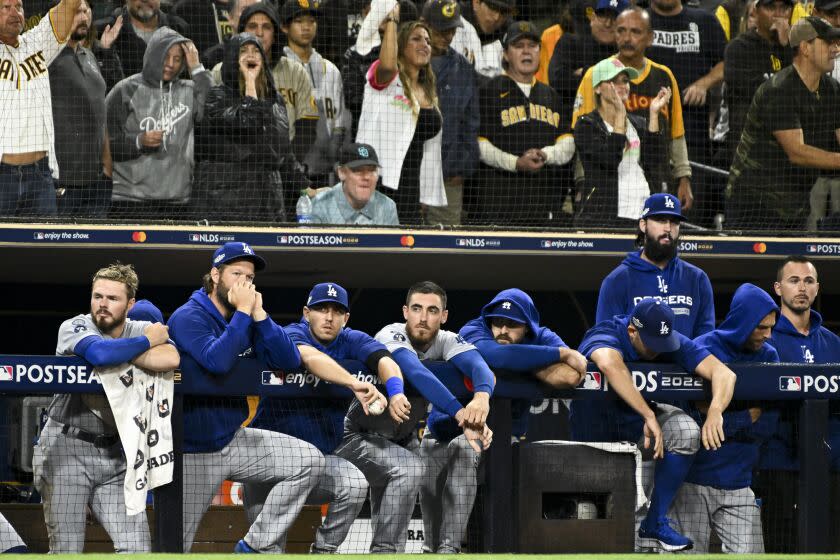
Dave Roberts walked out to the mound once, then again, in the seventh inning, two lonely treks with his team’s season on the brink.
The first time, the Dodgers still had a lead. They were still nine outs away from a season-saving win in Game 4 of the National League Division Series. They still had all their October goals within reach.
By the manager’s second visit, however, the score was tied, the San Diego Padres were threatening, and the Dodgers were suddenly hanging by a thread.
That the winningest team in franchise history found itself in such a predicament was a combination of many failings: Bad luck and mistimed mistakes; absent offense and questionable pitching plans; and bad execution most of all, with the Dodgers picking the worst possible time to play some of their worst baseball of the season.
Entering the playoffs, they had been the best team in the majors — on the mound, at the plate, in high leverage situations, everywhere.
But after a week of stranded runners and booted grounders and frustratingly few answers against a division rival they’d dominated all year, the Dodgers’ found themselves on the verge of elimination.
After a remarkable 111-win regular season, their World Series dreams were about to be dashed in an autumn blink.
“October baseball,” first baseman Freddie Freeman said, “can be very brutal sometimes.”
More than a week later, the shock hasn't worn off. Not for Roberts. Not for the front office. Not for just about anyone associated with a team that’s captured only one championship — in a pandemic-altered, neutral-site 2020 World Series — out of 10 consecutive postseason trips.
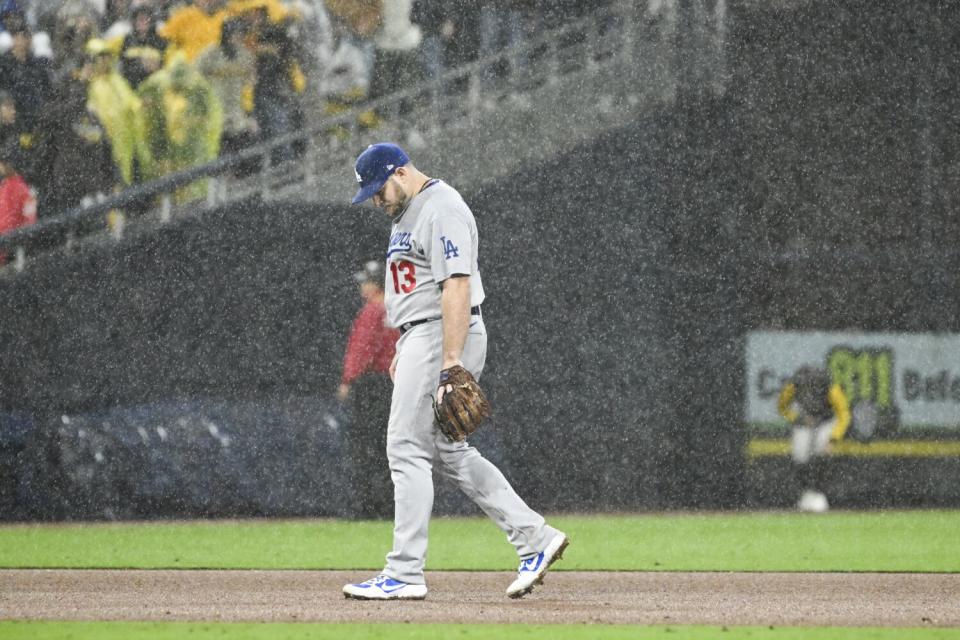
“If you're asking me if I think the best team wins the World Series every year, I would say no,” president of baseball operations Andrew Friedman said at an end-of-season news conference last week. “I think the hottest team wins the World Series every year.”
The fact that the top-seeded Dodgers couldn’t be both will sting all offseason.
Perhaps it was just bad luck, the vagaries of baseball dealing the club an unwinnable hand.
Or maybe there was something bigger amiss, leaving evaluators both inside the organization and around the rest of the industry wondering whether subtle endemic weaknesses keep contributing to the team’s all-too-common playoff failures.
As winter sets in, it’s a question the Dodgers are reluctantly trying to answer, too, searching to determine why their well-oiled organizational machine once again sprung a postseason leak.
“There’s a lot of work and a lot of good things to take from this year,” Roberts said during a phone interview this weekend. “But how it ended, that’s where my mind is at. It’s been tough.”
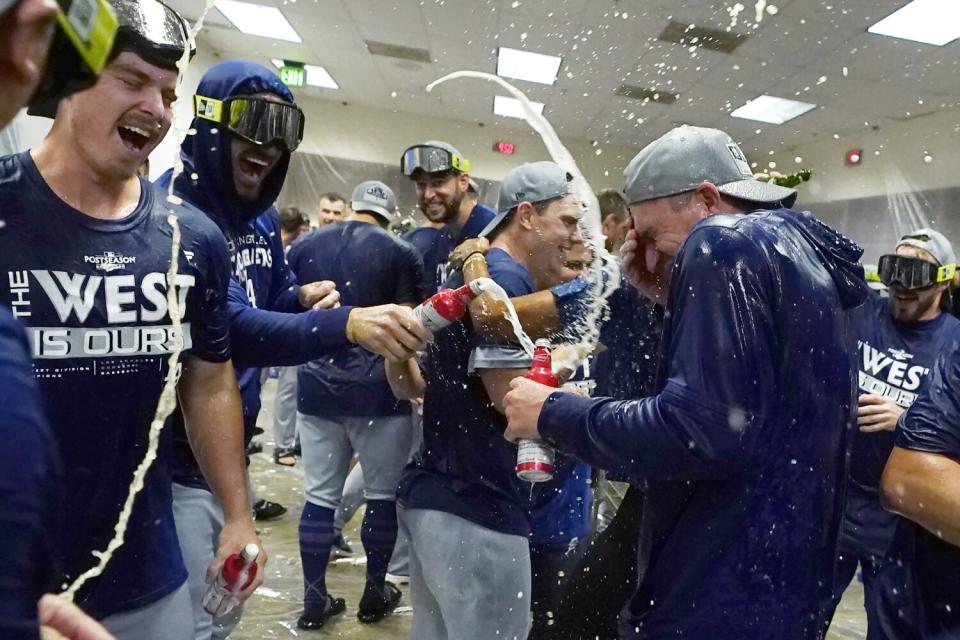
Plastic sheets lined the walls of the clubhouse. Bottles of Budweiser and Korbel champagne sprayed through the air.
Thirty-two days before they quietly filed out of the visiting locker room at Petco Park, the Dodgers excitedly doused the one at Chase Field in Arizona, celebrating a runaway National League West division championship that cemented their decade-long run of regular-season dominance.
They had locked up the division with 21 games to go.
They were on their way to becoming the seventh team in MLB history to eclipse 110 wins and the first since the 2001 Seattle Mariners to score the most and yield the fewest runs in the same season.
And they were doing it with a familiar blueprint — pairing an explosive lineup with a crafty pitching staff, and a star-studded core with waves of depth that Friedman and his staff had so meticulously assembled over the years.
“We feel really good about not just the talent in this room, but the way it’s come together,” a smiling, beer-soaked Friedman said the night they clinched the division. “It’s something that you hope for in the offseason, but you never really know until you see it play out.”
In hindsight, however, cracks were growing in the foundation.
While their rotation was headlined by Julio Urías, Clayton Kershaw and Tyler Anderson, the fissure created by Walker Buehler’s Tommy John surgery was never completely filled.
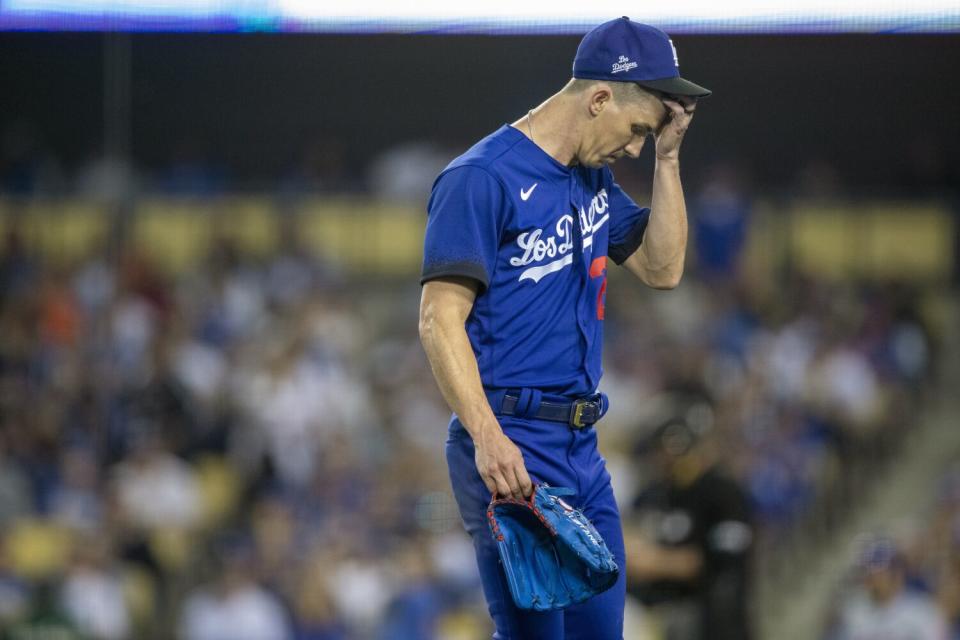
The team balked at the asking price for frontline rotation help at the trade deadline — “I don't regret not doing a bad deal for us,” Friedman said — and planned instead to lean on Tony Gonsolin and Dustin May. After both of them suffered late-season injuries that limited their playoff workloads, though, the Dodgers had only three trusted starters entering the NLDS.
A consistent but banged-up bullpen was also being stretched increasingly thin.
They had to compensate for the rotation’s lack of length. They had to work around set-up man Blake Treinen’s lingering shoulder injury. And late in September, they also adopted a closer-by committee approach after the demotion of veteran Craig Kimbrel from the role.
The biggest problem, though, was with the club’s league-leading offense.
Gavin Lux, Justin Turner and Chris Taylor all missed time down the stretch with injuries. Other key hitters — from the superstar trio of Freeman, Trea Turner and Mookie Betts, to season-long disappointments in Cody Bellinger and Joey Gallo — closed the year slumping to varying degrees.

The Dodgers still finished the regular season as the major-league leaders in scoring, team on-base-plus-slugging percentage and almost every statistical category with runners in scoring position.
But their decline over the final couple of weeks, when they batted just .215 and averaged less than 3 ½ runs per game over their final 15 contests, carried into the postseason.
"The postseason is not easy," Betts said. "Nobody's gonna roll over and let you win."
A five-run outburst early in Game 1 of the NLDS was followed by five silent innings from the offense, forcing their bullpen to grind out a 5-3 win.
A similar script played out in Game 2 — the Dodgers went scoreless for the final six innings and finished 0 for 8 with runners in scoring position — only this time in a 5-3 loss, after the Padres surged in front late following a Trea Turner error.
As the series shifted to San Diego, troubling trends were already taking hold.
What had been a relatively balanced lineup in the regular season quickly became top-heavy, with everyone from Will Smith (three for 16) to Justin Turner and Trayce Thompson (each two for 13) to Taylor and Bellinger (who went a combined one for 14 with nine strikeouts while splitting time in the outfield) struggling throughout the series.
The team’s big three of Betts, Trea Turner and Freeman did better — their combined OPS in the series was .979, compared to a .531 mark from the rest of the team — but still failed to consistently spark rallies at the top of the order.
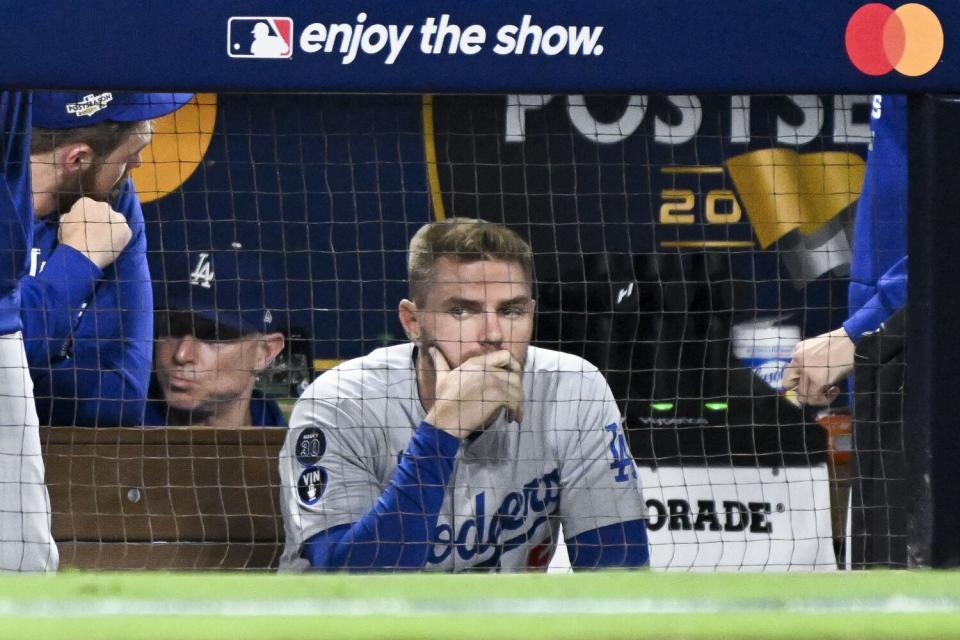
Scouts noticed that the Padres pitching staff, and their surprisingly stout bullpen in particular, attacked the Dodgers differently, relying more on secondary breaking pitches that exploited holes in a lineup that did its most damage against fastballs during the regular season.
As a result, the Dodgers strikeout rate climbed (11 per game in the NLDS, compared to 8.5 in the regular season). Their home run rate trended down (they hit only four in their four postseason games). And most of the opportunities they were generating went by the wayside, sending them to Petco Park tied with the Padres at one game apiece.
“We had a lot of opportunities,” Freeman said after Game 2. “We just didn’t catch them.”
“They come in and they're executing their pitches with really good stuff,” added third baseman Max Muncy. “So we gotta make the adjustment.”

When the Dodgers were knocked out by the Washington Nationals in the 2019 NLDS, they imploded on the mound in Game 5, but also batted just .135 during the series with runners in scoring position.
When the team was eliminated in the NLCS last year by the Atlanta Braves, a worn-out pitching staff contributed to the six-game defeat, but so too did missed opportunities at the plate, especially in their elimination game.
And of all the things that doomed the Dodgers to another October faceplant this year, situational hitting — specifically, a five for 34 mark (.147 average) with runners in scoring position — tripped them up most once again.
“If you were to boil it down to its simplest form, in the regular season, we led baseball in every statistical category with runners in scoring position,” Friedman said. “In the series, we were not good.”
Sometimes, the problem appeared to be with their approach.
In the third inning of a 2-1 loss in Game 3, for example, the Dodgers stranded two on base after Betts chased a 3-and-1 fastball out of the zone for a lineout, and Trea Turner whiffed on two curveballs in the dirt before taking a called third strike at the knees.
In other cases, they simply failed to capitalize on hittable pitches.
In the sixth inning of that same game, Justin Turner got two fastballs over the plate in a hitter’s count but fouled one off and fanned on the next, before Taylor grounded out on a first-pitch curveball to leave the tying run at second.
At one point, they went hitless in 20 straight at-bats with a runner at second or third base, their longest such drought of the season.
And then, in the most critical juncture of a Game 4 in which they faced elimination, the issue peaked with a wasteful sequence in the top of the seventh.
The Dodgers entered the inning leading 2-0. They then loaded the bases with no outs following a Betts walk, a Trea Turner bunt single and a Freeman hit by pitch.
They had a chance to put the contest away, force a winner-take-all Game 5 at home, and likely recapture all the momentum in the series.
A pathway to a pennant — particularly after the sixth-seeded Philadelphia Phillies’ upset of the 101-win Braves earlier in the day — still seemed within reach.
Alas …
Smith smoked a line drive to left, but directly at Jurickson Profar, who caught it for a sacrifice fly that traded a run for a key first out.
After Turner and Freeman pulled off a double steal, Muncy couldn’t get a beat on left-hander Tim Hill, fouling off one two-strike fastball in the zone before fanning for a costly strikeout on the next.
Justin Turner got ahead 2-and-1 in the next at-bat, but then chased a fastball off the plate for an easy grounder to end the inning.
It was all their problems — bad luck, bad execution, and bad swing decisions — showing up at once, a squandered chance that directly preceded the Padres' come-from-behind rally.
“In the postseason, when you don’t take advantage of opportunities, you can let a team hang around,” Roberts said. “We all got to be better.”
Why they weren’t is a question that will linger all offseason.
In the immediate aftermath of their defeat, players struggled to find concrete answers.
"Why? I have no idea,” Justin Turner said. “It's something we were good at all year but unfortunately we didn't execute in the postseason when it matters."
The club’s hitting coaches don’t seem to be the scapegoat, either, after Friedman stated his intentions of bringing back the entire staff for next season.
“In totality,” Friedman said, “we performed extremely well on that front.”
Some evaluators believe the answer lies more with the team’s October mentality — a communal edge that appeared to be lacking at times during the series.
“I was shocked at how boring they were as a team,” said one rival NL scout, who wasn’t authorized to speak publicly. “It’s a very professional team, and it’s a very good team. But I’d like to see a little more emotion.”
Other people inside the Dodgers organization have privately wondered similar things, questioning why the Padres seemed like the more determined team during the series’ defining sequences.
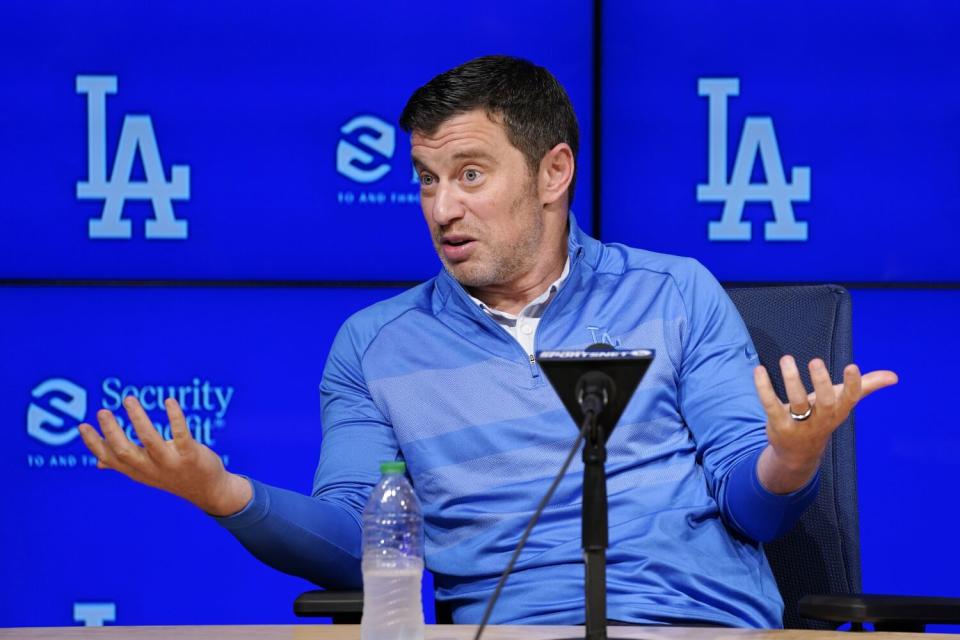
The significance of such intangibles are difficult to gauge in baseball.
As Betts noted prior to Game 4, “It's not like you can get hyped to go run through a wall. It's slow, methodical. So no matter how excited and hyped you get, baseball just doesn't work that way.”
It isn’t as though the Dodgers always wilt under a playoff spotlight, either. While their 2020 World Series run was contested in front of empty stadiums or sparsely-populated neutral-site crowds, there was still no team more effective at moving baserunners and manufacturing big innings.
But this year, as their season slipped away, the Dodgers' outwardly subdued persona hardly seemed to escalate — contrasting sharply with the Padres’ impassioned underdog mentality.
“We felt confident going in even though we had not taken a series from [the Dodgers] all year,” Padres manager Bob Melvin told the San Diego Union-Tribune. “Once we won [Game 2] over there, to bring it back home, we felt really confident that we wouldn’t go back to L.A.”
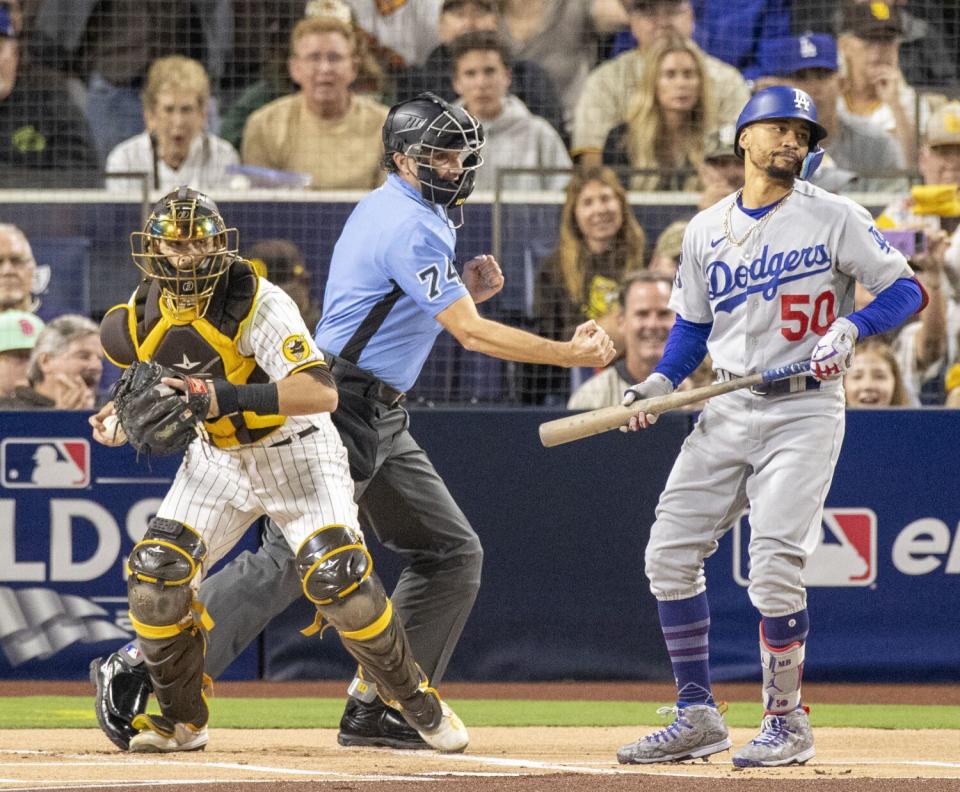
Of course, hitting with runners in scoring position isn’t the only vehicle for October success.
The American League’s top-seed, the Houston Astros, were a similarly woeful three for 23 in such situations in their ALDS against the Seattle Mariners. They swept the series, however, behind a few timely home runs, more consistent defense and a dominant pitching performance the Dodgers fell well short of replicating.
As feared, the Dodgers didn’t get length from their rotation, with none of their pitchers lasting longer than five innings (in this year’s playoffs, only the Braves averaged fewer innings per game from their starters).
They didn’t get much dominance from their starters, either, as only Anderson managed to keep the Padres off the board during his Game 4 outing.
In the aftermath of the series, both Friedman and Roberts insisted the Dodgers’ demise wasn’t the fault of their pitching.
But the staff failed to compensate for the lineup’s collective shortcomings too.
It left their margin for error thin throughout the series.
And in the bottom of the seventh in Game 4, it finally backfired in a inning that will long live in Dodgers infamy.
Tommy Kahnle didn’t retire any of the Padres’ bottom-three hitters, exiting after one run crossed the plate to make it 3-1.
Yency Almonte gave up the tying runs on a Ha-Seong Kim double and Juan Soto single, stumbling through the teeth of the order while top reliever Evan Phillips was saved for a ninth inning that never came.
Then Jake Cronenworth effectively ended the game, belting a go-ahead, two-run, two-out single to center field three pitches after a shocking mid-at-bat pitching change.
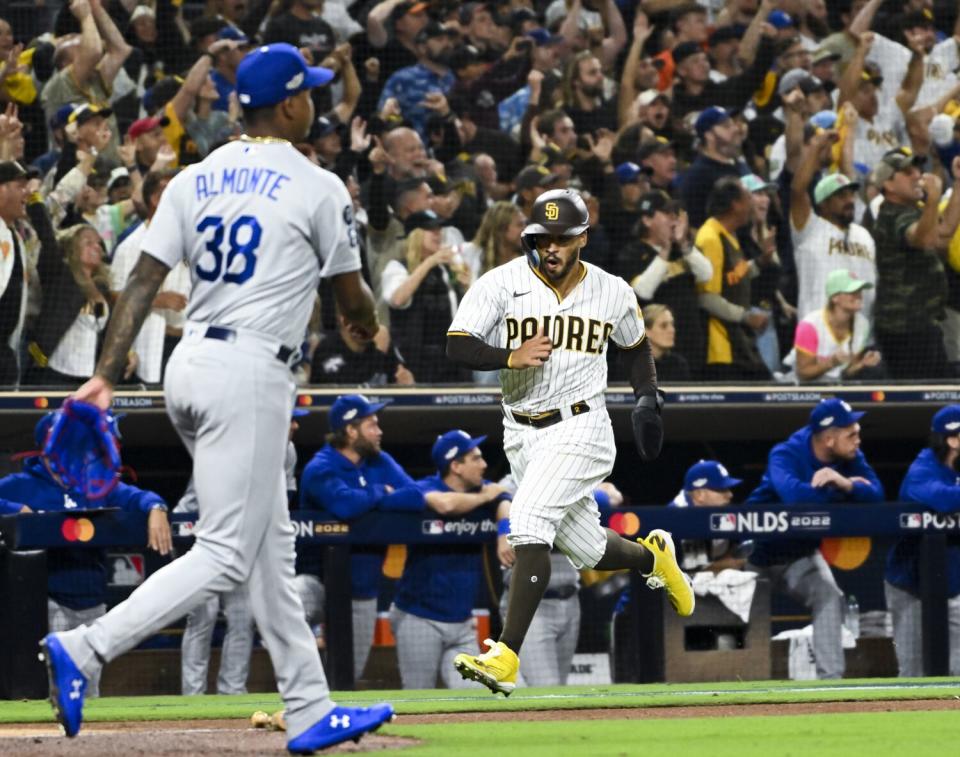
The latter sequence still sticks out the most.
With Cronenworth, a left-handed hitter, at the plate, the Dodgers wanted to give the left-handed reliever Alex Vesia a few extra moments to get loose in the bullpen (though Vesia later said he was already warm by then).
So, the dugout decided to call for a pick-off move, with bench coach Bob Geren signaling it in with a coded touch of his nose and ears.
Somewhere along the line, though, the call “got lost in translation,” Roberts said.
Almonte instead threw a pitch, pulling a fastball just off the plate. Smith seemed to be expecting it, staying crouched in his receiving position as the umpire called ball one.
Looking back, Roberts argued it ultimately was a moot point.
Vesia quickly turned a 1-and-0 count to a 1-and-2 advantage. The Dodgers still found themselves where they wanted to be, one left-on-left strike away from escaping the inning tied.
“I thought we were gonna get him out,” Roberts said, “and win the game.”
When that didn’t happen, it put the whole inning through a different lens — an emblematic example of how a carefully-crafted, seemingly invincible regular-season team came up empty in the end.
“I think there is something to making your own breaks,” Roberts said. “When you don’t execute, when you don’t capitalize on opportunities, things like that come into play.”
Where the Dodgers go from here is unclear.
Trea Turner is a free agent, and anything but a guarantee to return to Los Angeles. Justin Turner has a $16-million club option and Bellinger could be non-tendered. Anderson headlines a group of other out-of-contract pitchers.
Even Kershaw’s future is once again up in the air, with the 34-year-old left-hander set to become a free agent for the second consecutive winter.
"It's not fun no matter when you lose,” Kershaw said after Game 4. “But at the same time, it's what I said at the beginning of the year. It's better to be in it than not to be part of it at all. I'll always take the chance.”
Later, he added, “It's just a matter of inches here and there.”
However their roster shakes out, the Dodgers will almost certainly be contenders again next season.
They’ll reload on the mound, with Dustin May and a collection of other young arms seemingly primed for bigger roles. They’ll retool at the plate, likely to incorporate more prospect talent into the mix, as well. They’ll explore the possibility of adding big-name free agents, with Aaron Judge and Jacob deGrom expected to headline this year’s class of available players.
And they’ll find other ways to bolster their talent pool, with a well-established track record of finding hidden gems in unexpected places.
“The way that it ended, we’re going to come back hungrier than we’ve ever been,” Roberts said. “This has left a sour taste in all of our mouths. I think it’s more motivation to get better and finish the season as the last team standing.”
Much of that, however, has been true for the Dodgers after almost every playoff elimination in the past decade.
And only once were they the last team standing at the end.
This year’s squad was supposed to be capable of the same.
Instead, they suffered one of the club’s earliest eliminations in recent memory, an “organizational failure,” in the words of Friedman, that leaves nothing but confusion and regret in its wake.
“We're gonna do our best to use this time wisely,” Friedman said, “and do everything we can to pick ourselves off the ground.”
This story originally appeared in Los Angeles Times.

